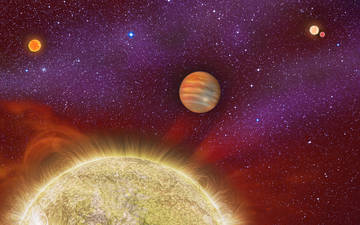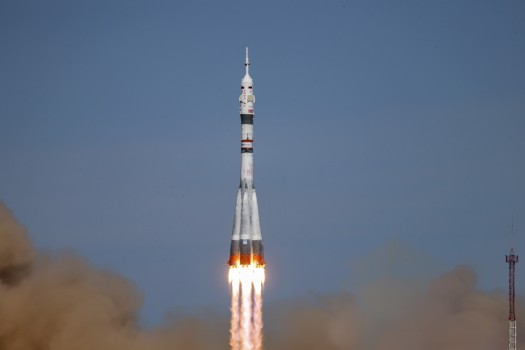
This artist's conception shows the 30 Ari system, which includes four stars and a planet. Image Credit: Karen Teramura, UH IfA
WASHINGTON (PTI): Astronomers using a telescope, fitted with an optics system developed by Indian researchers and colleagues, have discovered a massive planet residing in a four star system 136 light-years away from Earth.
This is only the second time a planet has been identified in a quadruple star system. While the planet was known before, it was thought to have only three stars, not four.
The findings help researchers understand how multiple star systems can influence the development and fate of planets.
Growing up as a planet with more than one parent star has its challenges. Though the planets in our solar system circle just one star - our Sun - other more distant planets, called exoplanets, can be reared in families with two or more stars.
The discoveries were made using instruments fitted to telescopes at the Palomar Observatory in San Diego: the Robo-AO adaptive optics system, developed by the Inter-University Centre for Astronomy and Astrophysics in Pune and the California Institute of Technology in Pasadena, and the PALM-3000 adaptive optics system, developed by NASA's Jet Propulsion Laboratory in California, and Caltech.
The first four-star planet, KIC 4862625, was discovered in 2013 by citizen scientists using public data from NASA's Kepler mission.
The latest discovery suggests that planets in quadruple star systems might be less rare than once thought. In fact, recent research has shown that this type of star system, which usually consists of two pairs of twin stars slowly circling each other at great distances, is itself more common than previously believed.
"About four per cent of solar-type stars are in quadruple systems, which is up from previous estimates because observational techniques are steadily improving," said co-author Andrei Tokovinin of the Cerro Tololo Inter-American Observatory in Chile.
The newfound four-star planetary system, called 30 Ari, is located 136 light-years away in the constellation Aries.
The system's gaseous planet is enormous, with 10 times the mass of Jupiter, and it orbits its primary star every 335 days.
The primary star has a relatively close partner star, which the planet does not orbit. This pair, in turn, is locked in a long-distance orbit with another pair of stars about 1,670 astronomical units away.
Astronomers think it's highly unlikely that this planet, or any moons that might circle it, could sustain life.
Were it possible to see the skies from this world, the four parent stars would look like one small Sun and two very bright stars that would be visible in daylight.
 Previous Article
Previous Article Next Article
Next Article












The Indian Air Force, in its flight trials evaluation report submitted before the Defence Ministry l..
view articleAn insight into the Medium Multi-Role Combat Aircraft competition...
view articleSky enthusiasts can now spot the International Space Station (ISS) commanded by Indian-American astr..
view article